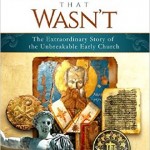My younger son is preparing for confirmation. The program this year is more involved than in past years; each month, the confirmands are required to study twenty or so questions from the Youcat—with their parents—and take an on-line quiz. Questions resulting from this steady are used to direct the next class session. It’s very cool, and we’re enjoying it quite a bit.
Anyway, we were discussing question 76 (“Why did God become man in Jesus?”) about how Christ is fully human, like us in all things but sin, and how consequently Christ is the best example of a fully mature human being, man as he should be. I used a favorite example of mine, the oak tree. When you plant an acorn, you don’t get an oak tree immediately; you get a shoot, and then a sapling. But every acorn, given the proper conditions, will in time grow into that grand, beautiful, majestic oak, the oak tree in the fullness of its oakiness. Of course, conditions aren’t always proper: if the soil is wrong, or water is scarce, the tree will be stunted, and might die before it is fully grown. It might be a mere shadow of an oak tree.
We are like the oak tree: given time we mature into the fullness of humanity, conditions permitting. One of those conditions is the aid of Christ in light of his redemption. We are also unlike the oak tree; we can choose to reject Christ and his aid, and we will grow stunted and not what we should be. That’s the effect of sin. And there I left it. Job done, I thought; ’nuff said.
Later on, though, it occurred to me: we value the majestic oak for its majesty, not for its fruit—but Christ values fruitfulness. We aren’t called to be oak trees, standing in solitary grandeur, but apple trees, trees laden with fruit for the benefit of others.
And there’s a thing about fruit trees: to reach maximum yield they have to be pruned. They are also topped regularly, so that the fruit is easier to pick. A wild untended apple tree might be taller and more majestic than a tended tree, but it will also be far less fruitful. And conversely, the most fruitful tree might not be much to look at. And this shouldn’t surprise us. As Isaiah says, “he had no form or comeliness that we should look at him, and no beauty that we should desire him” (Is 53:2b); and yet Christ is the most fruitful of all men.
To follow him, to bear fruit, we must be pruned. It may well be that the pruning will diminish our beauty in the eyes of the world. But if we are fruitful, what does it matter?











